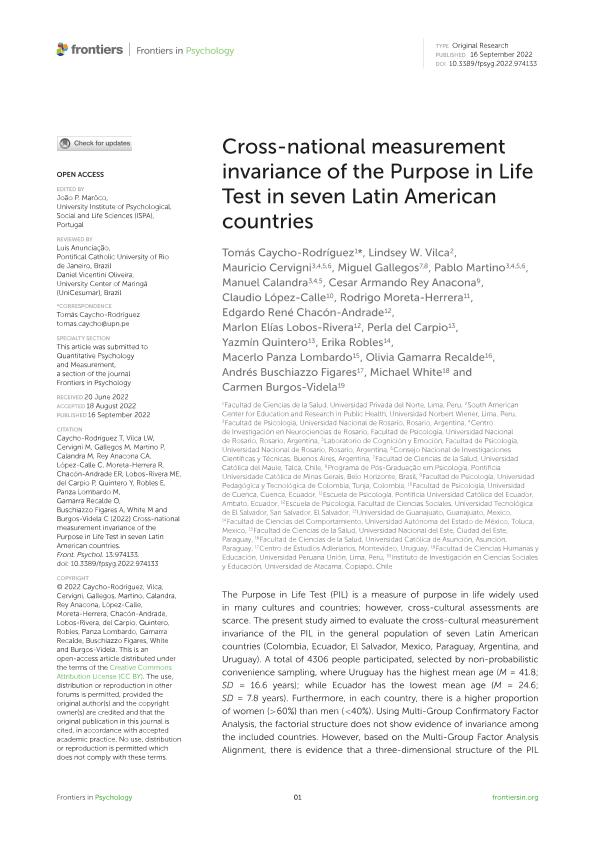Mostrar el registro sencillo del ítem
dc.contributor.author
Caycho Rodríguez, Tomás
dc.contributor.author
Vilca, Lindsey W.
dc.contributor.author
Cervigni, Mauricio Alejandro

dc.contributor.author
Gallegos de San Vicente, Miguel Omar

dc.contributor.author
Martino, Pablo Luis

dc.contributor.author
Calandra, Manuel Santiago

dc.contributor.author
Rey Anacona, Cesar Armando
dc.contributor.author
López Calle, Claudio
dc.contributor.author
Moreta Herrera, Rodrigo
dc.contributor.author
Chacón Andrade, Edgardo René
dc.contributor.author
Lobos Rivera, Marlon Elías
dc.contributor.author
del Carpio, Perla
dc.contributor.author
Quintero, Yazmín
dc.contributor.author
Robles, Erika
dc.contributor.author
Panza Lombardo, Macerlo
dc.contributor.author
Gamarra Recalde, Olivia
dc.contributor.author
Buschiazzo Figares, Andrés
dc.contributor.author
White, Michael
dc.contributor.author
Burgos Videla, Carmen
dc.date.available
2023-08-11T15:53:11Z
dc.date.issued
2022-09
dc.identifier.citation
Caycho Rodríguez, Tomás; Vilca, Lindsey W.; Cervigni, Mauricio Alejandro; Gallegos de San Vicente, Miguel Omar; Martino, Pablo Luis; et al.; Cross-national measurement invariance of the Purpose in Life Test in seven Latin American countries; Frontiers Media; Frontiers in Psychology; 13; 9-2022; 1-24
dc.identifier.issn
1664-1078
dc.identifier.uri
http://hdl.handle.net/11336/207969
dc.description.abstract
The Purpose in Life Test (PIL) is a measure of purpose in life widely used in many cultures and countries; however, cross-cultural assessments are scarce. The present study aimed to evaluate the cross-cultural measurement invariance of the PIL in the general population of seven Latin American countries (Colombia, Ecuador, El Salvador, Mexico, Paraguay, Argentina, and Uruguay). A total of 4306 people participated, selected by non-probabilistic convenience sampling, where Uruguay has the highest mean age (M = 41.8; SD = 16.6 years); while Ecuador has the lowest mean age (M = 24.6; SD = 7.8 years). Furthermore, in each country, there is a higher proportion of women (>60%) than men (<40%). Using Multi-Group Confirmatory Factor Analysis, the factorial structure does not show evidence of invariance among the included countries. However, based on the Multi-Group Factor Analysis Alignment, there is evidence that a three-dimensional structure of the PIL (Meaning of existence, Freedom to make meaning in daily life and Will to find meaning in the face of future challenges) is the same in the participating countries. Results based on item response theory indicate that most PIL items can significantly differentiate responses according to the level of life purpose. In addition, people with low life purpose will tend to choose the lower response alternatives on the PIL; while people with higher life purpose will choose higher response alternatives. The findings indicate that the PIL has the potential to increase knowledge about how people conceive and experience their purpose in life in different countries.
dc.format
application/pdf
dc.language.iso
eng
dc.publisher
Frontiers Media

dc.rights
info:eu-repo/semantics/openAccess
dc.rights.uri
https://creativecommons.org/licenses/by-nc-sa/2.5/ar/
dc.subject
ANALYSIS ALIGNMENT
dc.subject
CROSS-CULTURAL
dc.subject
LATIN AMERICAN
dc.subject
MEASUREMENT INVARIANCE
dc.subject
PURPOSE IN LIFE
dc.subject.classification
Otras Psicología

dc.subject.classification
Psicología

dc.subject.classification
CIENCIAS SOCIALES

dc.title
Cross-national measurement invariance of the Purpose in Life Test in seven Latin American countries
dc.type
info:eu-repo/semantics/article
dc.type
info:ar-repo/semantics/artículo
dc.type
info:eu-repo/semantics/publishedVersion
dc.date.updated
2023-07-05T15:24:10Z
dc.journal.volume
13
dc.journal.pagination
1-24
dc.journal.pais
Suiza

dc.journal.ciudad
Lausana
dc.description.fil
Fil: Caycho Rodríguez, Tomás. Universidad Privada del Norte; Perú
dc.description.fil
Fil: Vilca, Lindsey W.. Universidad Norbert Wiener; Perú
dc.description.fil
Fil: Cervigni, Mauricio Alejandro. Consejo Nacional de Investigaciones Científicas y Técnicas. Centro Científico Tecnológico Conicet - Rosario; Argentina. Universidad Nacional de Rosario. Facultad de Psicología. Secretaria de Ciencia y Tecnología. Centro de Investigación en Neurociencias; Argentina
dc.description.fil
Fil: Gallegos de San Vicente, Miguel Omar. Consejo Nacional de Investigaciones Científicas y Técnicas. Centro Científico Tecnológico Conicet - Rosario; Argentina. Universidad Católica de Maule; Chile. Pontifícia Universidade Católica de Minas Gerais; Brasil
dc.description.fil
Fil: Martino, Pablo Luis. Consejo Nacional de Investigaciones Científicas y Técnicas. Centro Científico Tecnológico Conicet - Rosario; Argentina. Universidad Nacional de Rosario. Facultad de Psicología. Secretaria de Ciencia y Tecnología. Centro de Investigación en Neurociencias; Argentina
dc.description.fil
Fil: Calandra, Manuel Santiago. Universidad Nacional de Rosario. Facultad de Psicología. Secretaria de Ciencia y Tecnología. Centro de Investigación en Neurociencias; Argentina
dc.description.fil
Fil: Rey Anacona, Cesar Armando. Universidad Pedagógica y Tecnológica de Colombia; Colombia
dc.description.fil
Fil: López Calle, Claudio. Universidad de Cuenca; Ecuador
dc.description.fil
Fil: Moreta Herrera, Rodrigo. Pontificia Universidad Católica del Ecuador; Ecuador
dc.description.fil
Fil: Chacón Andrade, Edgardo René. Universidad del Salvador; Argentina
dc.description.fil
Fil: Lobos Rivera, Marlon Elías. Universidad del Salvador; Argentina
dc.description.fil
Fil: del Carpio, Perla. Pontificia Universidad Católica del Ecuador; Ecuador
dc.description.fil
Fil: Quintero, Yazmín. Universidad del Salvador; Argentina
dc.description.fil
Fil: Robles, Erika. Universidad del Salvador; Argentina
dc.description.fil
Fil: Panza Lombardo, Macerlo. Universidad de Guanajuato; México
dc.description.fil
Fil: Gamarra Recalde, Olivia. Universidad Catolica Nuestra Señora de la Asuncion; Paraguay
dc.description.fil
Fil: Buschiazzo Figares, Andrés. Universidad Autónoma del Estado de México; México
dc.description.fil
Fil: White, Michael. Universidad Peruana Unión; Perú
dc.description.fil
Fil: Burgos Videla, Carmen. Universidad de Atacama; Chile
dc.journal.title
Frontiers in Psychology
dc.relation.alternativeid
info:eu-repo/semantics/altIdentifier/url/https://www.frontiersin.org/articles/10.3389/fpsyg.2022.974133/full
dc.relation.alternativeid
info:eu-repo/semantics/altIdentifier/doi/http://dx.doi.org/10.3389/fpsyg.2022.974133
Archivos asociados
